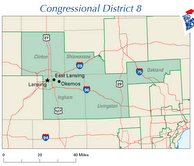... and a little attention.
Last week, Mike Rogers was firmly against including any kind of extension to unemployment benefits. He felt that cash money was all we needed:
I disagreed with him on this one, rather vociferously.U.S. Rep. Mike Rogers, R-Brighton, said Friday that Congress should not spend more on government programs like unemployment compensation, but instead should quickly get the rebate checks into the hands of taxpayers. (emphasis added)
Now, it looks as though he's changed his tune a little, moving from "should not spend" to
Rogers said he has no problem extending unemployment insurance, but adding it toHe's concerned about "loading it [the stimulus package] up." We should all be concerned about loading it up, but it's worth taking a look at at different policies and their effectiveness.
the stimulus package will slow things down.
The Congressional Budget Office offers a concise and readable overview of the various policies for short-term stimulus. Excerpted for your reading pleasure, here's a comparison of one-time rebate checks versus extended unemployment benefits. Expanding the food stamp program and corporate tax cuts are also included, just for fun.
Lump-Sum Rebate
Cost-effectiveness = large
Lag from enactment to stimulus = medium
Uncertainty about effects = large
A rebate is generally likely to be more effective the more it is focused on people who are likely to spend it. A rebate whose size increases for people with larger tax liabilities is likely to be less effective than a uniform refundable one. Experience is mixed with respect to effectiveness, introducing some uncertainty about the rebate's effect. Processing and mailing the rebate checks would take some time.Extending or Expanding Unemployment Benefits
Cost-effectiveness = large
Lag time from enactment to stimulus = short
Uncertainty about effects = small
These benefits are regularly extended in recessions, and most of any additional benefits are likely to be spent quickly.
Temporarily Increasing Food Stamp Benefits
Cost-effectiveness = large
Lag time from enactment to stimulus = short
Uncertainty about effects = small
Additional benefits are likely to be spent rapidly by recipients, who tend to be experiencing periods of economic difficulty.Cut in Corporate Tax Rates
You can keep an eye on Mr. Rogers' changing stimulus proposals, or you could just watch the Weather Channel to see which way the wind is blowing. With a little more public attention, he may just discover that extending benefits for a state that is struggling with the nation's jobless rate is the smart thing to do -- economically and socially.Cost-effectiveness = small
Lag time from enactment to stimulus = long
Uncertainty about effects = smallCorporate tax rate reductions have only a limited effect on new investment decisions and may take time to affect business investment because capital spending decisions are often made in advance. Improved cash flow may, however, have some effect on investment decisions, especially among smaller firms.









